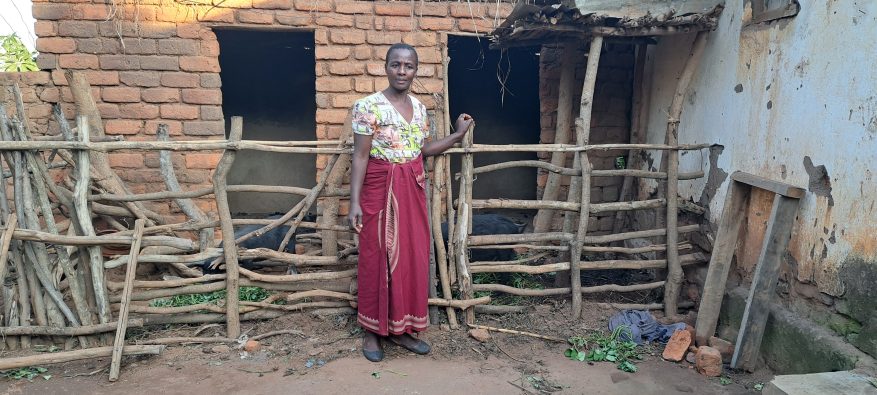Melia outside her home, Mulanje District.
More than a year and a half after Cyclone Freddy brought devastation to Melia and thousands of families just like hers in Mulanje district of southern Malawi, the widowed mother of three is now rebuilding her life.
Thanks to support that she received under a World Food Programme Cyclone Recovery Project implemented by Self Help Africa, Melia is now in a position where she can buy food, pay school fees for her children and is a member of a local Village Savings & Loans group where she is saving to support her small business.
Using a ‘Food for Assets’ approach, the project provided cash transfers and other support to 4,000 participants, in exchange for their involvement in community-projects to enhance resilience and livelihoods. In Mulanje, this included the building of trenches, dams and stone bunds (protective low walls) to prevent soil erosion caused by flooding. This has allowed Melia to pursue her business goals. As a member of her local Village Savings & Loans group, she has been able to invest in livestock and expand her pastry-making business to supplement her income.
“This project provided a lifeline for us. We thought we were forgotten after the cyclone happened. But this project remembered us and we are rebuilding our lives” said Melia. “We still buy food essentials, we pay school fees and are part of Village Savings & Loan groups that help our business.”
Cyclone Freddy is not the only major weather event to impact Malawi in recent times. Since 2019, the country has seen an increase in adverse weather events, including tropical storm Ana and cyclone Gombe. These have been exacerbated by the COVID-19 pandemic, outbreaks of cholera and recent sharp rises in food prices. These shocks have led to a deterioration in living conditions and an increase in poverty.
Self Help Africa has worked alongside agencies, including UNICEF Malawi and the International Committee of the Red Cross, to support the Government’s response to these crises. The most recent, Cyclone Freddy, claimed over 500 lives, displaced 180,000 people and led to a deadly outbreak of cholera. Before this, over half of the population here – 58% – were affected by tropical storm Ana andcyclone Gombe in the last two years.
With climate change having an increasingly devastating effect across the world, and particularly in Africa, humanitarian responses have increasingly become part of our work at Self Help Africa. This project will support communities on the frontline of the climate emergency to adapt to, and mitigate the effects of a changing climate.
Learn more about our work in Malawi.

